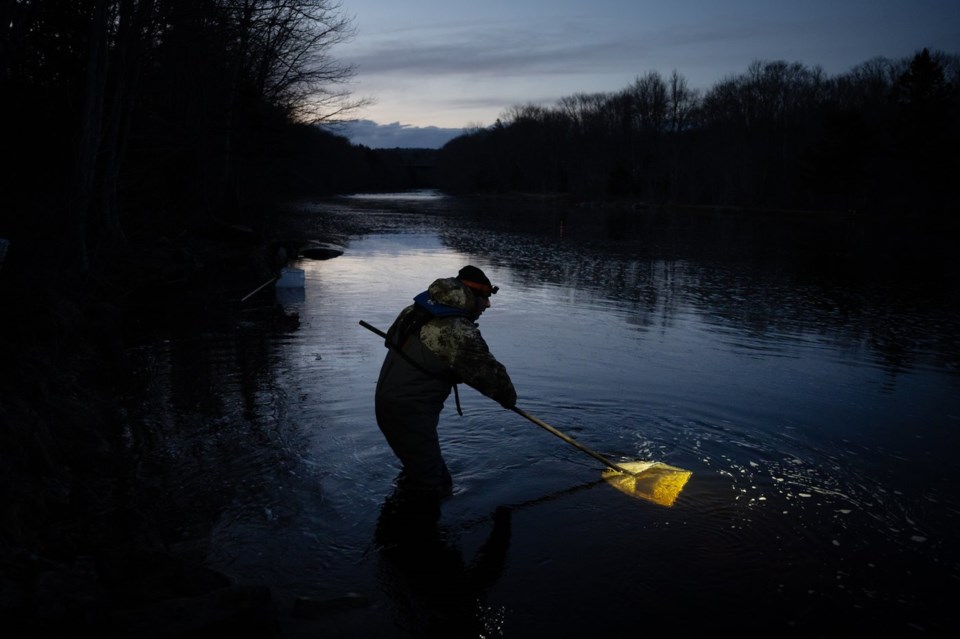GOLD RIVER — Some Mi'kmaq harvesters say working within Ottawa's quotas for the contentious baby eel fishery is helping calm the tense atmosphere in their river workplaces.
In the shallows of the Gold River last Friday night, as the tiny, translucent eels known as elvers emerged from the mud, Jay Pennell — a member of the nearby Wasoqopa'q First Nation — swept his nets back and forth through the water and recalled past confrontations.
"There's been lots of incidents on rivers we've been on in prior years," Pennell said. "But right here on Gold River, there's been nothing this year .... It's very peaceful."
By day he's a carpenter in the community 75 kilometres southwest of Halifax; at night he dons hip waders and dips a mesh net in the chilly tidal river, catching a 2025 quota allocated through what's known as the Treaty Rights Protected Fishery.
The fishery is overseen by staff with the Kwilmu'kkw Maw-klusuaqn, or KMK — the administrative arm of the Assembly of Nova Scotia Mi'kmaw Chiefs.
Pennell said that before Ottawa negotiated this quota, relations were poor with non-Indigenous fishers harvesting the river. Under the new system, the First Nations under the KMK umbrella have exclusive rights.
And Pennell said when Department of Fisheries and Oceans officers arrive, he refers them to the "river monitor," a member of the Indigenous fisheries team who logs each fisher's harvest. "I find DFO is a lot more respectful this year when they come down to the water than in the past," he said.
That's a sharp contrast with the strains elsewhere in the province between federal enforcement and Indigenous fishers who aren't accepting federal limits.
On April 26, a fisherman from Sipeknekatik First Nation, one of three communities rejecting Ottawa's quota system, was charged with assault with a weapon for allegedly backing his car into a fisheries officer who wanted to inspect his catch. Days earlier, four men were arrested for fishing without licences and 60 kilograms of elvers — worth about $100,000 — were seized and released back into the Musquodoboit River.
Justin Martin, the KMK fisheries manager, said the team of nine is making progress in establishing the "communal" fishery, even amid the occasional harshly worded social media post from Mi'kmaq fishers who criticize the catch limits being imposed.
"There's a public perception of lawlessness in this fishery and that's not the case. We have hundreds of fishers actively demonstrating self-governed, conservation-based management," Martin said in an interview Friday.
Under the rules negotiated with Ottawa, the eight First Nations involved have received a total quota of just over 1,900 kilograms — about 20 per cent of the total elver catch for the Maritimes. This quota and exclusive access to certain rivers was shifted from the commercial licence-holders, who have received no compensation for the transfer.
Martin said the communities involved have opted to allow a large number of fishers with small maximum catches, based on the Mi'kmaq principle of "Netukulimk," which roughly translates as "take only what you need."
He said that's meant about 750 fishers were allocated an initial minimum quota of one kilogram, with the ability to apply for up to four more kilograms after they catch their first kilogram. In addition, he said the fishery prohibits the use of "highly efficient" fyke nets, a funnel-shaped net that can catch large quantities of elvers.
Stanley King, a manager with commercial licence holder Atlantic Elver Fishery Ltd., said in a recent email that while reconciliation with First Nations "is a worthwhile pursuit," the family-owned businesses have lost large portions of their livelihood. He said it's simply wrong that Ottawa hasn't provided compensation.
He also said it's unfair the Indigenous fishers are permitted to track their catch on a separate app before the information is transferred to the federal "Elver Monitoring and Traceability" app his employees use. He worries that opens the door to some of the catch not being reported.
Debra Buott-Matheson, a spokeswoman for DFO Maritimes, said in an email that the department is working with KMK to ensure information from their harvesters is entered into their system.
Prices, meanwhile, have plunged this season, from highs of about $5,000 per kilogram two seasons ago to current levels of $1,500 per kilogram — a concern for longtime elver fishers and the new Indigenous entrants.
David Bishop, another Wasoqopa'q fisher working on the Gold River, said that while he appreciates the calm on the water, the tight catch limits mean small returns for the effort he puts in. He thinks committed fishers like him who are willing to put in long hours should get a higher quota.
"There are people who may be here just a few days who have the right to have the same catch I have," he said.
With current prices, five kilograms of elvers brings in about $7,500, a fraction of the roughly $30,000 Pennell said he could earn a few seasons ago when prices were higher.
However, he said he's hopeful in future seasons prices will return to old levels. And the elver income helps his daughter, who fishes her quota alongside him, to cover expenses like her university tuition.
"This is the first year. We're going to learn from this and build on it," he said.
This report by The Canadian Press was first published May 1, 2025.
Michael Tutton, The Canadian Press




